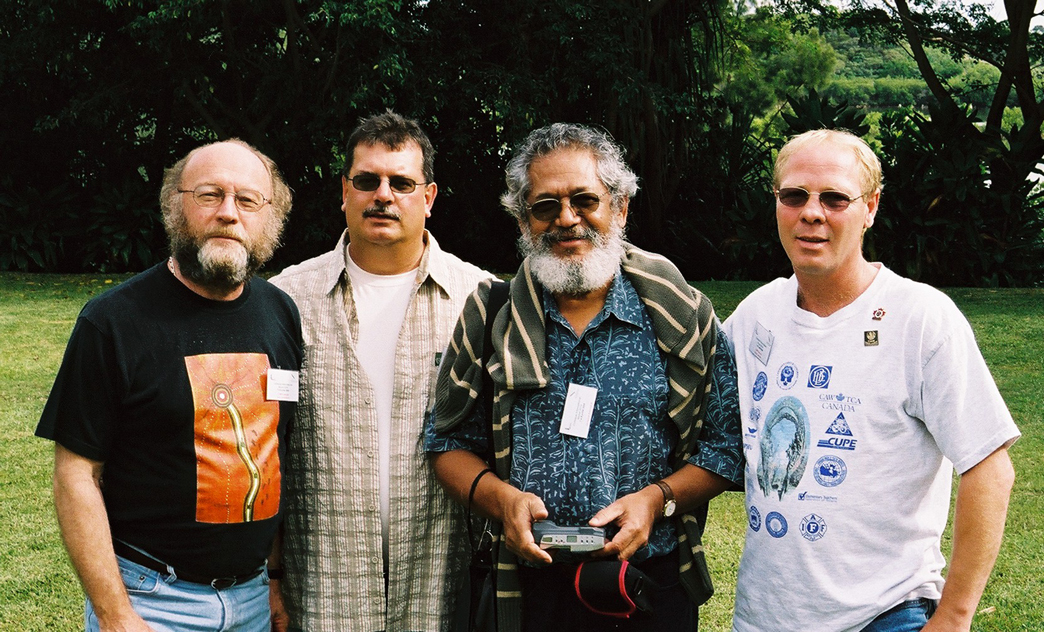With an estimated 25% of known nickel reserves, the tiny South Pacific island of New Caledonia is a priority area for Canadian mining corporations Inco and Falconbridge. Both companies are currently engaged in major expansions, and both projects are characterized by social, political and environmental controversy.
The indigenous population, the Kanaks of New Caledonia, are struggling for the recognition of and respect for local indigenous rights and they do so against tremendous odds. (See Newsletter #18 for background information.) In a parallel fashion, the unions representing the mine and smelter workers are also trying to determine how best to protect the collective rights of the workforce in a situation where environmental regulations, health and safety legislation and enforcement and vocational training are at a bare minimum.
Of ultimate concern is whether the legitimate representational structures of both the Kanaks and the workers can overcome their own suspicions of each other. The elimination of existing tensions and divisions in the search to find common cause is essential if the unfettered power of foreign mining corporations and a French colonial government that clearly will not easily give up its nickel colony are to be successfully challenged.
These issues formed the basis of an international symposium held in Noumea, the capital city, on July 7-8, 2005. In attendance were unionists from Canada (Steelworkers and the Canadian Auto Workers-CAW), Australia, Belgium, Japan, New Zealand, Switzerland and France. These unions either have a contractual relationship with Inco or Falconbridge in their own countries or they have an affiliation relationship with USOENC (Union des Syndicats d'Ouvriers et Employés de Nouvelle-Calédonie), the largest of three unions representing workers in the New Caledonia nickel industry, through international labour bodies.
The Symposium had as its initial central focus a major study entitled "Nickel 2010: A New Era" which had been conducted by SYNDEX, a French consulting firm with a 20-year working relationship with USOENC. Panels focusing on environmental and social issues generated considerable debate with an audience that grew to approximately 350 people over the two days. At one point in that debate, a prominent indigenous spokesperson put it very forcefully: "If you want peace in this country, you must consult the Kanak people."
USOENC as a trade union also put forward a list of 30 propositions dealing with reclamation issues, abandoned mines, mine closures, environmental and industrial health and safety legislation, labour law and employment training. Absent, unfortunately, from the Union propositions was any reference to respecting or supporting Kanak indigenous rights as a minimal condition for economic development.
Following the conference, mine and smelter site visits to the SLN, Falconbridge and Inco projects allowed the international delegations to visually observe and inquire about the massive projects that are in progress. In each case a central question was to what extent Kanak people will gain meaningful employment from projects that will define the New Caledonia economic reality for generations and decades to come. The companies are saying the right things on this point, but it remains a mystery why so many foreign skilled workers are being brought in for the construction phase of the projects when it only seems logical that Kanak and other local workers would benefit from learning these skills. A skilled and educated working class must know more than just how to mine and smelt nickel.
Environmental questions loom equally large in a country where mountain top upon mountain top is visibly scarred after a century of nickel mining. The Inco-Goro project is at the top of the environmental list of concerns as manganese effluent will be dumped into the pristine lagoons of a reef-surrounded island at levels of concentration that even Inco management cannot prove to be environmentally safe.
The Canadian joint union delegation did not pretend to have ready or simple answers for New Caledonians, indigenous or otherwise. This small island has suffered enough colonialism as it is. We did, however, assert three points that hopefully will prove of some political worth.
Firstly, it was pointed out that Canadian mining companies have become the "Ugly Americans" of the industry, especially in their overseas operations. The Sub-Committee on Foreign Affairs and International Trade (SCFAIT) investigation of the Canadian mining industry recommendations were highlighted to the New Caledonian audience. It is that report which calls for more stringent regulations and enforcement mechanisms to ensure that the industry complies with internationally acceptable social and environmental standards.
Secondly, the point was made emphatically that Canadian companies such as Inco and Falconbridge must not be allowed to get away with corporate behaviour in New Caledonia that they could not get away with in Canada. If an effluent cannot be dumped into the Niagara River or the lakes of Canada, then it cannot be dumped into the waters surrounding the coral reef in New Caledonia. It is the responsibility of unions in Canada and New Caledonia to work together, along with environmental organizations and other concerned citizens, to ensure that enforceable regulations are in place.
Finally, despite the difficulties and inevitable tensions, legitimate unions and indigenous organizations must walk the path of social justice together in their joint determination to leave a positive and harmonious social, political and environmental legacy for future Kanaky-New Caledonian generations.
Report written by Ken Luckhardt, Member of MiningWatch Canada Board, and participant representing the CAW-Canada International Department at the New Caledonia Nickel Symposium.
